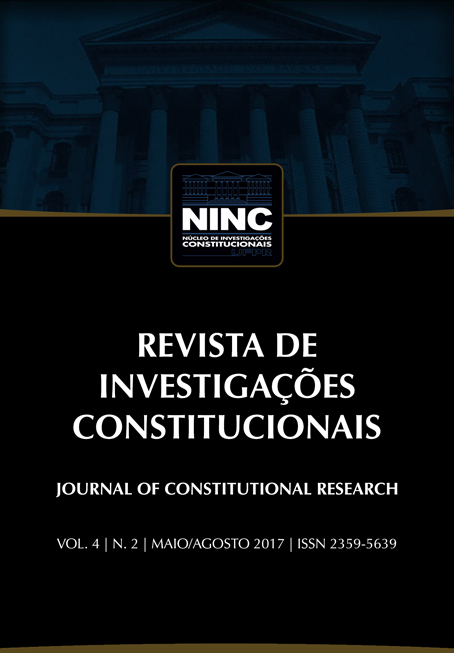Does the internet eraser button for youth delete first amendment right of others?
DOI:
https://doi.org/10.5380/rinc.v4i2.50287Palavras-chave:
Social media, Do Not Track Kids Act, eraser button, First Amendment, information.Resumo
Will Facebook and similar posting sites soon come to an end from hefty civil fines and consent decrees? Is Internet discourse at risk? That may be the case if lawmakers succeed in passing the Do Not Track Kids Act. As drafted, the law would require operators of children directed websites to include an eraser button to remove user posted content and would penalize mom and pop run sites unable to afford the financial and technological resources to comply with the mandate. This Note argues that if enacted, the law would constitute a presumptively impermissible burden on Free Speech under the First Amendment and should be subject to strict scrutiny.
Referências
BARTON, Joey. The Communicators with Representative Joe Barton. C-SPAN, Washington D.C. Available on: <http://www.cspan.org/video/?318011-1/communicators-representative-joe-barton-rtx>.
BUMP, Philhip. Finally, We Know How Many Bloggers Live in Their Parents’ Basement. Washington Post, Washington D.C, mar. 2015. Available at: <http://www.washingtonpost.com/blogs/wonkblog/wp/2015/03/25/finally-we-know-how-many-bloggerslive-in-their-parents-basement/>.
GARFINKEL, Simson. How to Delete Regrettable Posts from the Internet. MIT Technology Review, Cambridge, oct. 2012. Available at: <https://www.technologyreview.com/s/506521/how-to-delete-regrettable-posts-from-the-internet/>.
HEINS, Marjorie. The Brave New World of Social Media Censorship. Harvard Law Review, Cambridge, v. 127, n. 325, p. 325-330, jun. 2014. Available at: <https://harvardlawreview.org/2014/06/the-brave-new-world-of-social-media-censorship/>.
KOHM, James; MOORE, Robin L. Anatomy of an Order Enforcement Program. Antitrust, Connecticut, v. 29, n. 3. 2015.
LENHART, Amanda. Teen, Social Media & Technology Overview. Pew Research Center, Washington, apr. 2015. Available at: <http://www.pewinternet.org/2015/04/09/teens-social-media-technology-2015/>.
MADDEN, Mary, et al. Teens Social Media, & Privacy. Pew Research Center, Washington, may 2013. Available at: <http://www.pewinternet.org/2013/05/21/teens-social-media-and-privacy/>.
MARKEY, Ed. The Do Not Track Kids Act of 2013. 2013. Available at: <http://www.markey.senate.gov/documents/2013-11-14_DNTK_1pager.pdf>.
PETERSON, Andrea. Author of California Online Eraser Law: It’s Not Always Easy to Find the Delete Button. Washington Post. Washington, sept. 2013, Available at: <https://www.washingtonpost.com/blogs/the-switch/wp/2013/09/25/author-ofcalifornia-online-eraser-law-its-not-always-easy-to-find-the-delete-button/>.
REESE, Diana. Escape from Westboro Baptist Church: Is Fresh Start Possible for Phelps’s Granddaughters? Washington Post, Washington, feb. 2013. Available on: <http://www.washingtonpost.com/blogs/she-thepeople/wp/2013/02/09/escape-from-westboro-baptist-church-is-fresh-start-possible-for-fred-phelps-granddaughters/>.
WANG, Yang; LEON, Pedro Giovanni; CHEN, Xiaoxuan; KOMANDURI, Saranga; NORCIE, Gregory. From Facebook Regrets to Facebook Privacy Nudges. Ohio State Law Journal, Columbus, vol. 74, n. 6, p. 1307-1334, nov./dec. 2013.
WEINSTEIN C. Emily. The Personal is Political on Social Media: Online Civic Expression Patterns and Pathways among Civically Engaged Youth. International Journal of Communication, Los Angeles, vol. 8, p. 210-233, 2014.
Downloads
Publicado
Como Citar
Edição
Seção
Licença
Autores que publicam nesta revista concordam com os seguintes termos:- Autores mantém os direitos autorais e concedem à revista o direito de primeira publicação, com o trabalho simultaneamente licenciado sob a Creative Commons - Atribuição 4.0 Internacional que permite o compartilhamento do trabalho com reconhecimento da autoria e publicação inicial nesta revista.
- Autores têm autorização para assumir contratos adicionais separadamente, para distribuição não-exclusiva da versão do trabalho publicada nesta revista (ex.: publicar em repositório institucional ou como capítulo de livro), com reconhecimento de autoria e publicação inicial nesta revista.
- Autores têm permissão e são estimulados a publicar e distribuir seu trabalho online (ex.: em repositórios institucionais ou na sua página pessoal) a qualquer ponto antes ou durante o processo editorial, já que isso pode gerar alterações produtivas, bem como aumentar o impacto e a citação do trabalho publicado (Veja O Efeito do Acesso Livre).
























